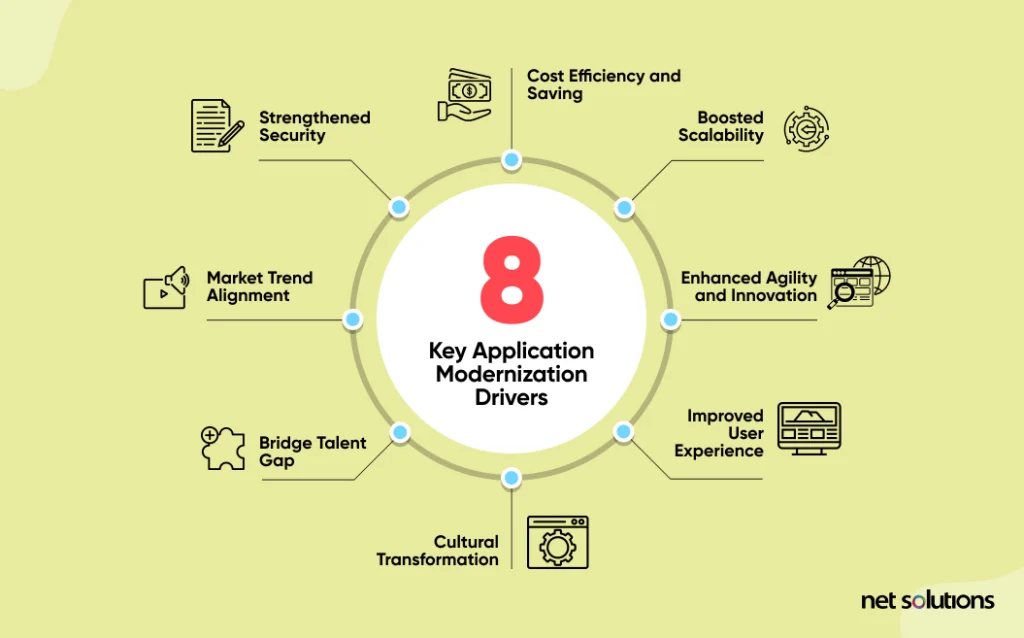Why engage in digital transformation and app modernization? What value does it offer a company, and how does it increase market share or boost the bottom line?
These are essential questions to answer before engaging in an application modernization strategy. After all, executives need to understand the business value it offers, and explaining the drivers and benefits of modernization must be a core component of your business case.
The following eight drivers highlight the key benefits of application modernization, and you’ll want to weigh those pay-offs against the investment of time, energy, and resources.

Cost Efficiency and Savings
A strong cost-benefit analysis must support every strategic business initiative. In most cases, application modernization is a cost-effective decision that ultimately pays for itself.
Yes, app modernization requires a significant upfront investment, but legacy systems cost more in the long run than modern, cloud-based apps. This is especially true when you implement your program strategically and employ best practices in app modernization.
Why are modern apps more cost-effective? Modern applications:
- Come with lower maintenance costs since they require fewer fixes and workarounds
- Use fewer resources because they’re designed to be more efficient and work with cloud-based architecture
- Produce less downtime that can impact productivity and the customer experience
- Are more secure, requiring fewer security patches and reducing overall risk
As per the CAST report,
- Companies worldwide are burdened with 61 billion workdays of technical debt.
- Globally, 45% (nearly half) of the world’s code is deemed fragile, making it susceptible to failure.
- The problem is so large that if the world’s 25 million developers worked on nothing but this problem, it would still take nine years to solve.
When you modernize legacy applications and work with a powerful, flexible cloud platform, your software engineers can apply their expert knowledge toward projects that add value to your internal and external customers.
Enhanced Agility and Innovation
Modern, cloud-based applications improve business agility compared to existing ones relying on mainframes and other monolithic technology.
Techies often think of agility in terms of software development —building flexible solutions with rapid iterations based on user feedback. API-first applications that use microservices and containerization services like Kubernetes open many doors. Working with modern apps also enhances a software team’s ability to implement DeVops and Agile methodologies, but that’s just part of the equation.
Modern apps eliminate data siloes and offer a decisive competitive advantage through access to user data, helping companies better understand their market. For example, Under Armour harnessed data from its fitness apps to spot a walking-for-exercise trend in Australia. Since they noticed the trend long before their competitors did, they were able to capitalize on it.
The extra agility offered by modernization means:
- Quicker innovation
- Reduced time-to-market
- Greater time and resources to experiment with new, tech-based strategies
Agility and innovation can produce a powerful competitive edge, representing a strong driver for app modernization efforts.
Strengthened Security
Cybersecurity is vital in today’s world of supply chain attacks, malware, ransomware, and other threats.
Modern applications offer greater Data security through regular updates and more opportunities to integrate the latest Development Security Operations (DevSecOps) practices.
Security technology offered through modern, cloud-based apps includes:
- Data encryption
- Multi-factor authentication
- Continuous monitoring
The collaborative approach to security, governed by DevSecOps principles, stresses the need to automate testing throughout development. Modernized apps are infinitely more suited to automation than legacy apps and have fewer vulnerabilities.
Boosted Scalability
The immense scalability of modern, cloud-based computing is something techies of the past could only dream of. Many great companies of the past crashed and burned because their servers couldn’t keep up with growing user demand.
Remember Friendster from the early 2000s? As David Kirkpatrick explained in The Facebook Effect, Friendster’s servers couldn’t handle the spikes in traffic caused by their rapid growth in popularity, forcing users to wait 30+ seconds for a single page to load.
The world quickly lost interest in Friendster due to its slow-loading pages, and we all moved on to the next shiny object, Myspace (for a minute).
To avoid becoming a victim of their success, the burgeoning new social media platform, Facebook, gated their user growth by giving exclusive access to university students, one school at a time. As funding grew, they purchased new servers and opened the platform to more and more universities.
All that, however, is ancient history. Cloud computing has changed everything, and companies with modern infrastructures can handle all the traffic fluctuations the market delivers. Thanks to the pay-as-you-go pricing model that public cloud services like AWS employ, you only pay for the data you use, and it’s available whenever you need it.
Cloud-based, modern, optimized apps can handle all kinds of workloads, and companies are free to grow and compete in new markets—scaling vertically or horizontally without hesitation.
Bridged Talent Gap
This modernization driver may come as a surprise. App modernization can attract smart, ambitious IT professionals to work with your organization full-time, whereas legacy apps often repel them.
Why would techies care how modern your apps are if they’re getting paid the same? As a Harvard Business Review study found, and countless other studies have confirmed, salary is not the deciding factor for workplace satisfaction.
Companies that use cutting-edge apps with modern infrastructures attract top talent because:
- Working with legacy apps can be an agonizing experience, dealing with downtime, complex workarounds, unhappy users, and limited functionality.
- Skilled IT workers love working with the latest technology.
- Legacy apps often require knowledge of otherwise obsolete programming languages and systems.
Application modernization can help bridge the talent gap at your organization, attracting ambitious experts who are inspired to work for a cutting-edge organization.
Improved User Experience and Satisfaction
Legacy apps often produce a poor user experience, resulting in lower customer satisfaction and reduced market share. Ultimately, this impacts profits.
The poor user experience results from downtime, frustration when apps don’t perform as customers expect, unappealing User Interfaces (UI), and a less-than-optimized User Experience (UX) that pushes customers toward your competitors.
Modernization efforts can lead to:
- Improved UX
- A more attractive and functional UI
- Quicker load times
- Fully functional workflows
- Better overall performance
Companies can’t afford to offer anything less than a stellar customer experience in today’s competitive landscape.
Faster Alignment With Emerging Market Trends
The business world is changing fast, and not just in places like Silicon Valley, where companies compete through cutting-edge tech.
Enterprise retailers like Walmart are revolutionizing their approach to supply chain management and eCommerce, allowing them to maintain dominance over their traditional markets and gobble up new market share in younger, urban markets.
Modern apps with a cloud-based infrastructure make it easier to:
- Optimize supply chain management through superior tracking and Internet of Things (IoT) technology
- Understand the marketplace better through big data and intelligent data processing
- Gain insights about customers and buying patterns through Artificial Intelligence and Machine Learning, which support data-based advertising and personalization.
- Introduce new features that support stronger eCommerce efforts and a superior customer experience.
These are a few examples of gaining a competitive edge thanks to a successfully executed app modernization project.
Bonus: Cultural and Workforce Transformation
Many overlook a surprising benefit of app modernization since it doesn’t directly relate to new applications, superior data centers, cloud migration, or any technical benefits we usually discuss.
When performed strategically, App modernization can spark a cultural shift in an entire organization.
How could that be? Digital transformation often leads to the following:
- Innovative thinking in all departments, from Marketing to Operations, since you provide them with the technological tools to achieve their business goals.
- Creative problem-solving when assessing business needs and devising solutions.
- Greater employee engagement, especially from your most intelligent, innovative employees. These employees are proud to work for a company doing new, exciting things.
Additionally, digital transformation initiatives typically demand cross-functional collaboration. This breaks down those departmental siloes that produce an “us vs. them” mentality between teams and impede understanding.
It’s amazing what organizations can accomplish when different departments work together toward common goals, and cutting-edge technology has the power to bring diverse professionals together.

Ready to Dive into Legacy Application Modernization?
Net Solutions has over 30 years of experience with application development, and we’ve formed powerful partnerships with companies like American Golf and Euro Car Parts. We’ve helped them design and execute every aspect of their modernization approach and overcome common app modernization challenges.
Work with an experienced outsourcing partner who can help you design and implement modernization solutions that target mission-critical items. We can help you target projects with the highest business value and the greatest ROI.
SHARE THIS POST
Table of Contents
Related Resources
- A Framework-based Approach for App Assessment
- App Modernization Benefits To Boost Your ROI and Future-Proof Your Business
- 11 Top Application Modernization Best Practices in 2025
- Building a Winning Application Modernization Business Case
- Legacy Application Modernization Case Studies & Success Stories
- Solving the Toughest Application Modernization Challenges
- Cloud-Native Application Modernization: Benefits & Strategies
- Enterprise Application Modernization: Complete Guide [2025]
- Lift and Shift: The Modernization Formula for Legacy Apps
- Navigating Application Migration and Modernization [Guide]
- Application Modernization and Optimization: A Complete Guide
- A Practical Approach to Application Rationalization: A CIO's Guide to Managing Complexity and Reducing Costs
- What is Replatforming? A Beginner's Guide to Upgrading Your Technology Stack
- 7 Steps to Build an Effective Application Modernization Roadmap
- Application Modernization Services Market: Comprehensive Analysis
- A Step by Step Guide to Application Modernization Strategy
- Explore the Best Application Modernization Tools and Resources
- 13 App Modernization Trends That Can Support and Optimize Your App Modernization Strategy

